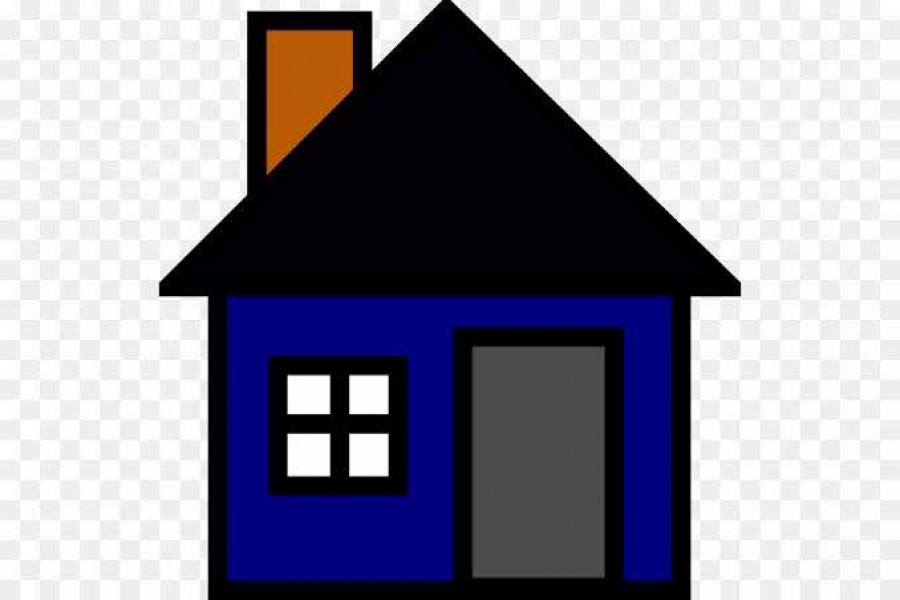Alongside provision of other basic needs like food, clothing, education and healthcare, shelter or housing is a constitutional right of Bangladeshi citizens. This is a fundamental obligation of the state, as enshrined in Article 15 of the Constitution. Also the National Housing Policies of 1993, 2008 and 2017 have pledged housing or accommodation of minimum quality for all citizens.
The UN Sustainable Development Goals (SDGs) declared speak about safe and affordable housing for all. In addition to providing shelter, security and social status, owning a house endows people with comfort and wellbeing. For low-income people living in towns and villages, ownership of a house carries special significance.
However, housing problem is quite acute in Bangladesh since there is large-scale scarcity of quality accommodation. The country's growing population now stands at around 170 million. The per-capita land entitlement is fast depleting.
Besides, residential houses are routinely damaged or destroyed by natural calamities. According to information provided by the National Housing Policy 2017, at least 1.0 million houses should have been built per year since 2015. But the actual number has lagged far behind the projected figure. Apart from dearth in quantity, there is widespread deficiency in quality. Statistics show, 80 per cent homes in rural areas are of low quality and short longevity.
Many eye-catching and beautiful residential buildings have now been built in Dhaka, Chattogram and other cities and towns. But it is difficult to estimate how many among these have complied with the stipulations of National Building Code (BNBC). Apart from proper structures, it is essential for them to have related facilities such as water and sewerage, electricity, fuel and arrangements for waste disposal.
Quality housing also requires appropriate environment with provisions for playgrounds, sports and recreation. In this respect, the rural habitats appear to be more environment-friendly, both physically and socio-culturally.
Social structures of villages are undergoing transformation. Alongside the hardcore poor who migrate to slums in urban centres, many upper-class people like landlords, the rich and the educated middle-class are leaving villages either for urban centres or for foreign destinations. Many ancestral homes of these migrant people therefore remain vacant. Many renovate their houses with modern fittings, so that they can stay there in comfort during short visits.
Undoubtedly, there have been massive changes in socio-economic status of the Bangladesh people during the past five decades, especially in urban centres like Dhaka. This has also contributed to huge disparities in income and wealth, a gap which has been visible in the housing sector as well. The affluent class may be small in proportion, but their number is quite large. Well-protected and secure residential areas have been built for them, some of which are now visible as gated communities. Most of these are actually apartment blocks. Besides, green parks, brick-laid walkways, blue lakes etc. are observed in some of these places. Some super-rich families are even building castle-like palaces at different spots.
The upper middle-class and middle-class families usually live in medium or small-sized apartments having limited floor-space. The private housing or real estate companies often target this segment of urban population. Currently, around 1,200 companies are enlisted with REHAB (Real Estate and Housing Association of Bangladesh). A few among them are making commendable contributions to solving the housing problem in cities including capital Dhaka.
Some housing companies also take up projects for building 'new towns', but they often resort to mere trading of plots. Besides, illegal procedures are allegedly adopted in some cases during execution of these ventures, which seriously undermine the environment. These include filling up low-land-cum-water-bodies and seizing government lands. Some large land development companies make negative contributions to land management in urban areas, and the regulatory authorities often fail to tackle them due to their huge influence in the corridors of power.
Alongside housing companies and government agencies, the cooperative organisations take part in housing efforts. The societies and cooperatives of professionals including those run by military personnel have a visible presence in metropolitan towns.
A large number of lower middle-class people mostly live in rented accommodations in cities and towns. In fact, the low-income or poor people in large cities like Dhaka and Chattogram are huge in number and account for at least one-third of their population. These poor urbanites mostly take shelter in numerous slums. But in terms of rent per square feet, they have to pay a high price for their accommodation as well as for utilities. Besides, the middlemen exploit them in many other ways.
The National Housing Policy states that the government should play a big role for the housing of lower middle-class, low-income and poor people. But what is being actually done is quite negligible or insufficient compared to the real requirement. The present government has taken the initiative of rehabilitating a few thousand slum dwellers by constructing small-sized flats in multi-storied buildings. But this initiative appears to be too late, too few.
The Constitution enshrines the philosophy of providing housing to all as well as removal of disparities between rural and urban population. The National Housing Policy-2017 provides necessary direction for the housing of all classes and segments. It also underscores the need for paying attention to the needs of the disadvantaged and underprivileged people and spells out the roles of various stakeholders in solving the housing problem.
The need of the hour is sincerity, dedication, efficiency, effectiveness and accountability of all relevant stakeholders including the government and private housing companies in materialising the goal of housing for all through a realistic, time-bound, expeditious and output-cum-outcome-oriented housing programme for the nation.
Dr. Helal Uddin Ahmed is a retired Additional Secretary and former Editor of Bangladesh Quarterly.


